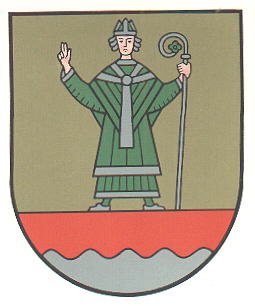Cuxhaven (kreis): Difference between revisions
Jump to navigation
Jump to search
Knorrepoes (talk | contribs) m (Text replacement - "{{de}}" to "") |
Knorrepoes (talk | contribs) No edit summary |
||
| Line 1: | Line 1: | ||
'''CUXHAVEN (CUX)''' | '''CUXHAVEN (CUX)''' | ||
| Line 12: | Line 10: | ||
|- | |- | ||
|'''German''' | |'''German''' | ||
| | | In Gold über von Rot und Silber wellenförmig geteiltem Schildfuß den Heiligen Bischof Nikolaus, in grünem, silbergerändertem Ornat, mit silbernen Schuhen und silbernem Krummstab, dessen Krümme in einer grünen vierblättrigen Rose endet, die rechte Hand zum Segen erhoben, mit silbernen Haaren und natürlicher Fleischfarbe. | ||
|- | |- | ||
|'''English''' | |'''English''' | ||
| Line 23: | Line 21: | ||
The arms show the H. Nicholas, patron saint of seafarers and coastal people. The saint was part of the arms of the Land Hadeln district and a popular saint in many villages in the district. The coastline and the many dikes in the area are symbolised in the base of the arms. | The arms show the H. Nicholas, patron saint of seafarers and coastal people. The saint was part of the arms of the Land Hadeln district and a popular saint in many villages in the district. The coastline and the many dikes in the area are symbolised in the base of the arms. | ||
<gallery widths=250px heights=200px perrow=0> | |||
File:Cuxhavenkp.jpg|alt=Wappen von Landkreis Cuxhaven/Arms (crest) of Landkreis Cuxhaven|Postal cancellation | |||
</gallery> | |||
Revision as of 05:17, 12 March 2023
CUXHAVEN (CUX)
State : Niedersachsen
Additions : 1977 Land Hadeln, Wesermünde
| German | In Gold über von Rot und Silber wellenförmig geteiltem Schildfuß den Heiligen Bischof Nikolaus, in grünem, silbergerändertem Ornat, mit silbernen Schuhen und silbernem Krummstab, dessen Krümme in einer grünen vierblättrigen Rose endet, die rechte Hand zum Segen erhoben, mit silbernen Haaren und natürlicher Fleischfarbe. |
| English | blazon wanted |
Origin/meaning
The arms were granted on July 2, 1975.
The arms show the H. Nicholas, patron saint of seafarers and coastal people. The saint was part of the arms of the Land Hadeln district and a popular saint in many villages in the district. The coastline and the many dikes in the area are symbolised in the base of the arms.
Literature: Linder and Olzog, 1996.

